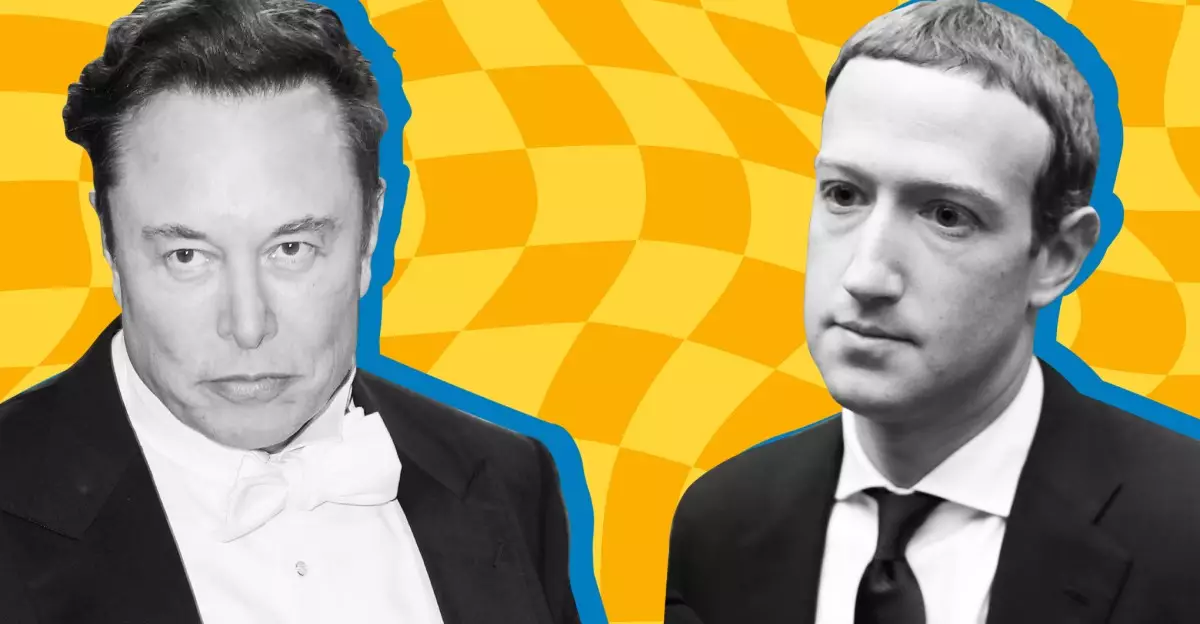In an era where artificial intelligence is rapidly becoming intertwined with daily life, an unexpected and humorous incident has emerged in several California cities, shedding light on both the potential and pitfalls of this technology. Over the weekend, the crosswalk buttons in Palo Alto, Menlo Park, and Redwood City were reportedly hacked, resulting in them broadcasting unconventional simulated voices of two of the most prominent figures in the tech industry: Elon Musk and Mark Zuckerberg. The playful nature of these AI-generated messages has drawn attention not only for their comedy but also for raising vital questions about the ethical boundaries of technology.
As the wave of AI continues to crest through society, it is imperative to understand how these systems can be manipulated. While some may chuckle at the parodic hijacking of public utilities, it closes the gap on serious concerns surrounding AI’s influence. The deployment of these cloned voices has added a layer of absurdity to otherwise mundane routines—yet beneath the humor lies a lurking unease regarding data privacy, cybersecurity, and the overall trajectory of AI development.
A Comedic Commentary on Tech Titans
The simulated interactions purportedly showcasing Musk’s and Zuckerberg’s vocal stylings—filled with self-deprecation and satire—have provided a comedic reflection of how tech CEOs are perceived by society. Among the striking quotes allegedly imitated by Musk are, “I’ll give you a Cybertruck, I promise” and “I’m so alone,” echoing the sometimes isolated experiences of powerful individuals who are built into larger narratives. Similarly, “undermining democracy” and “cooking our grandparents’ brains”—lines attributed to a faux Zuckerberg—monitor the public’s growing skepticism towards tech companies and their far-reaching influence on democracy and personal autonomy.
Humor is a powerful tool that allows people to grapple with uncomfortable realities. By tapping into the absurdities of what tech foundations have become under the leadership of these CEOs, the AI-created messages provoke thought and discussion about the broader implications of their actions. Musk and Zuckerberg may be titans of innovation, but what happens when that innovation begins to feel like a burden rather than a gift?
Public Perception and Its Consequences
The ramifications of these AI-generated voices extend beyond just public amusement. As the messages caught the attention of the media and the public, they inadvertently sparked a discourse about the perception of these tech moguls. Musk, known for his ambitious projects and sometimes erratic behavior, is lampooned in a way that humanizes his broader persona. The simulated Zuckerberg, on the other hand, plays into existing narratives about the ethical implications of social media and data privacy.
This kind of commentary through humor not only engages the public but can also serve as a critical lens through which society analyzes the implications of unchecked technological advancement. While the incidents serve as comedic relief for those who encounter the voices at crosswalks, the undertones of accountability resonate profoundly. The idea of an AI that could imitate influential leaders touches on the power of branding and social responsibility inherent in their roles.
The Fragility of Public Trust
Amid all the revelry, the episode casts a stark spotlight on the fragility of public trust in technology—especially when it comes to its integration into critical urban infrastructure. The fact that individuals were able to hack into these crosswalk buttons illustrates not just the vulnerabilities in cybersecurity, but also the latent fears society holds towards an increasingly digital world. The hacking of such everyday devices raises important questions: How secure are systems that influence our daily movement, and what ramifications arise when these systems are compromised?
This incident reveals a disconcerting trend—while we seek the benefits of AI and digital technology, we also must confront the chaos that ensues when their boundaries are blurred. The combination of humor and danger punctuated by the AI-cloned messages reminds us that playful uses of technology must co-exist with stringent ethical considerations.
The episode of AI-cloned voices in California serves as a quirky touchpoint in understanding the interplay between technology and society. As we laugh at the caricatures of familiar figures, we must simultaneously confront the emerging dilemmas surrounding AI—echoing the age-old adage that with great power comes great responsibility. The crosswalk incident is more than a humorous stunt; it is a call to action for tech leaders, policymakers, and the public to ensure that the evolution of AI remains a force for good rather than an unforeseen disruption.

